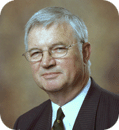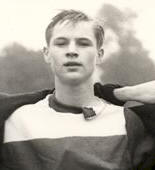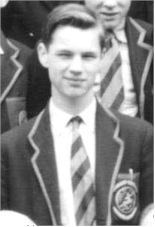
|
|
Having had a little fun with the Old Boy who became a Lord, Denis Tunnicliffe wrote back to us and provided us with a more accurate 'life' than this page purports to provide. Please see his letter and his CV. We are delighted that he got in touch and wish him huge success in the House of Lords. The Rail Safety and Standards Board summarises the start of Denis Tunnicliffe's career thus:
The Lord Tunnicliffe CBEDenis Tunnicliffe was born in Derby in 1943. He attended Derby Central School, a secondary technical school, later renamed Henry Cavendish School. There he gained a state scholarship and went on to study mathematics at University College London. He graduated with an honours degree in 1965. Whilst at university he joined the University of London Air Squadron, a RAFVR reserve unit where he learned to fly eventually receiving a RAFVR commission. After university he went to the College of Air Training at Hamble and gained a commercial pilot’s licence. He joined BOAC in 1966 serving as a co-pilot on the VC10 and later on the 747. During this period he became a pilot’s representative and in 1972 was invited to give up flying and join the management team. This was a period of great change, first, as BOAC and BEA merged to become British Airways and then the modernisation of the airline into, by the mid 80s, one of the world’s most successful airlines. He left in 1986 after serving in industrial relations, crew planning, fuel procurement, internal consultancy and marketing. In 1986 he joined the International Leisure Group as Chief Executive of the group’s aviation interest, which consisted of Air Europe and an interest in the newly formed Spanish airline, Air Europa. In 1988 he joined London Underground as Managing Director before becoming Chairman of London Underground, and Chief Executive of London Transport in 1998. His time at the Underground saw the trauma following the fire at Kings Cross, a new management structure, radically improved safety systems, significantly improved productivity and a doubling of investment in safety features, new and refurbished trains and significant investment in stations and other parts of the infrastructure. It also saw the building and opening of the Jubilee Line Extension, the first part of the Underground built to a decent modern standard, a new piece of railway that has changed the shape of London for ever. In 1998 when he became Chief Executive of London Transport he became responsible London Buses and the central functions. He oversaw the restructuring of London Transport to hand over all parts except the Underground to the Mayor in the summer of 2000 and the restructuring of the Underground in preparation for the Public Private Partnership to involve the private sector in the repair and renewal of the infrastructure. He left London Transport at the point of handover of the Buses and central functions to the Mayor in 2000. From early in 2002 he became, for two years, part time non-executive Chairman of the United Kingdom Atomic Energy Authority. The Authority is responsible for the management and decommissioning of its four major research sites as well as fusion research for both Europe and the UK government at Culham. In 2003 he became part time non-executive Chairman of the Rail Safety and Standards Board, an industry owned non-profit organisation that is responsible for Railway Group Standards, the Railway Group Safety Plan, safety research and development and leading industry wide safety initiatives. He is a trustee of Homerton College, Cambridge, Royal Holloway, University of London, the ACT Foundation and a non-executive director of the economics consultancy, cebr. He has been a member of the Labour Party since 1971, was a Councillor of the Royal Borough of New Windsor from 1972 till 1975, of the Royal County of Berkshire from 1974 till 1978 and of Bracknell District Council from 1983 till 1987. In 2004 he was appointed a Labour working peer in the House of Lords. Most recently he became a part time non-executive director of the Defence Logistics Organisation. He has been married since 1968 to Susan Dale, formerly biology and then primary teacher, advisory teacher, author, now a part-time academic at the Institute of Education, London and a magistrate. They moved from Windsor to Bracknell in 1972. He has two sons born in 1971 and 1973. The elder, Alan, lives in Reading and works in railway manufacturing. The younger, Richard is married with a baby son and lives in South Wales where he is an accountant. His interests include private flying and boating on the Thames. He is a member of the Royal Air Force Club and the Royal Automobile Club. January 2006 |



